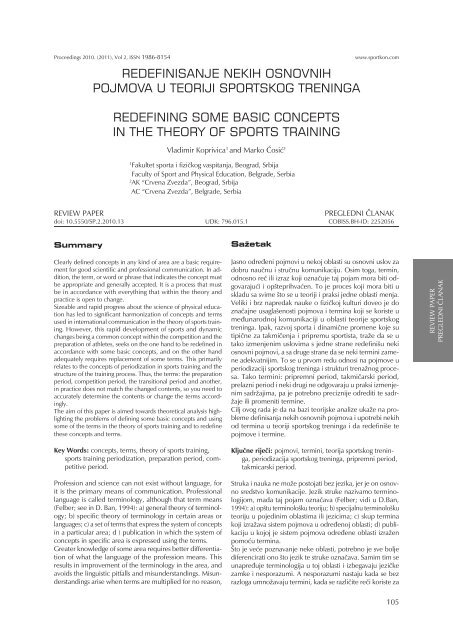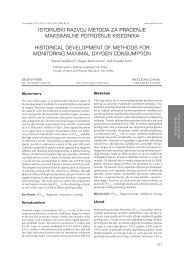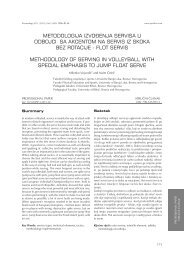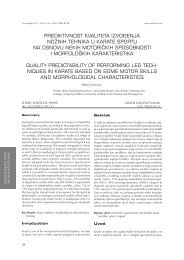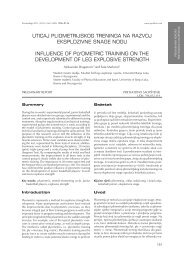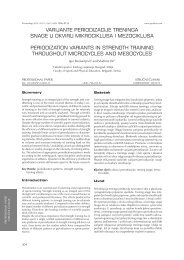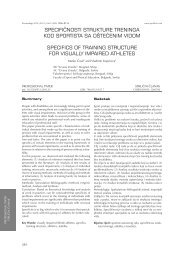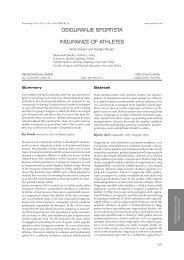redefinisanje nekih osnovnih pojmova u teoriji sportskog treninga ...
redefinisanje nekih osnovnih pojmova u teoriji sportskog treninga ...
redefinisanje nekih osnovnih pojmova u teoriji sportskog treninga ...
Create successful ePaper yourself
Turn your PDF publications into a flip-book with our unique Google optimized e-Paper software.
Proceedings 2010. (2011), Vol 2, ISSN 1986-8154<br />
REDEFINISANJE NEKIH OSNOVNIH<br />
POJMOVA U TEORIJI SPORTSKOG TRENINGA<br />
REDEFINING SOME BASIC CONCEPTS<br />
IN THE THEORY OF SPORTS TRAINING<br />
Vladimir Koprivica 1 and Marko Ćosić 1<br />
1<br />
Fakultet sporta i fizičkog vaspitanja, Beograd, Srbija<br />
Faculty of Sport and Physical Education, Belgrade, Serbia<br />
2<br />
AK “Crvena Zvezda”, Beograd, Srbija<br />
AC “Crvena Zvezda”, Belgrade, Serbia<br />
www.sportkon.com<br />
REVIEW PAPER<br />
PREGLEDNI ČLANAK<br />
doi: 10.5550/SP.2.2010.13 UDK: 796.015.1 COBISS.BH-ID: 2252056<br />
Summary<br />
Sažetak<br />
Clearly defined concepts in any kind of area are a basic requirement<br />
for good scientific and professional communication. In addition,<br />
the term, or word or phrase that indicates the concept must<br />
be appropriate and generally accepted. It is a process that must<br />
be in accordance with everything that within the theory and<br />
practice is open to change.<br />
Sizeable and rapid progress about the science of physical education<br />
has led to significant harmonization of concepts and terms<br />
used in international communication in the theory of sports training.<br />
However, this rapid development of sports and dynamic<br />
changes being a common concept within the competition and the<br />
preparation of athletes, seeks on the one hand to be redefined in<br />
accordance with some basic concepts, and on the other hand<br />
adequately requires replacement of some terms. This primarily<br />
relates to the concepts of periodization in sports training and the<br />
structure of the training process. Thus, the terms: the preparation<br />
period, competition period, the transitional period and another,<br />
in practice does not match the changed contents, so you need to<br />
accurately determine the contents or change the terms accordingly.<br />
The aim of this paper is aimed towards theoretical analysis highlighting<br />
the problems of defining some basic concepts and using<br />
some of the terms in the theory of sports training and to redefine<br />
these concepts and terms.<br />
Jasno određeni pojmovi u nekoj oblasti su osnovni uslov za<br />
dobru naučnu i stručnu komunikaciju. Osim toga, termin,<br />
odnosno reč ili izraz koji označuje taj pojam mora biti odgovarajući<br />
i op{teprihvaćen. To je proces koji mora biti u<br />
skladu sa svime {to se u <strong>teoriji</strong> i praksi jedne oblasti menja.<br />
Veliki i brz napredak nauke o fizičkoj kulturi doveo je do<br />
značajne usagla{enosti <strong>pojmova</strong> i termina koji se koriste u<br />
međunarodnoj komunikaciji u oblasti teorije <strong>sportskog</strong><br />
<strong>treninga</strong>. Ipak, razvoj sporta i dinamične promene koje su<br />
tipične za takmičenja i pripremu sportista, traže da se u<br />
tako izmenjenim uslovima s jedne strane redefini{u neki<br />
osnovni pojmovi, a sa druge strane da se neki termini zamene<br />
adekvatnijim. To se u prvom redu odnosi na pojmove u<br />
periodizaciji <strong>sportskog</strong> <strong>treninga</strong> i strukturi trenažnog procesa.<br />
Tako termini: pripremni period, takmičarski period,<br />
prelazni period i neki drugi ne odgovaraju u praksi izmenjenim<br />
sadržajima, pa je potrebno preciznije odrediti te sadržaje<br />
ili promeniti termine.<br />
Cilj ovog rada je da na bazi teorijske analize ukaže na probleme<br />
definisanja <strong>nekih</strong> <strong>osnovnih</strong> <strong>pojmova</strong> i upotrebi <strong>nekih</strong><br />
od termina u <strong>teoriji</strong> <strong>sportskog</strong> <strong>treninga</strong> i da redefini{e te<br />
pojmove i termine.<br />
REVIEW PAPER<br />
PREGLEDNI ČLANAK<br />
Key Words: concepts, terms, theory of sports training,<br />
sports training periodization, preparation period, competitive<br />
period.<br />
Profession and science can not exist without language, for<br />
it is the primary means of communication. Professional<br />
language is called terminology, although that term means<br />
(Felber; see in D. Ban, 1994): a) general theory of terminology;<br />
b) specific theory of terminology in certain areas or<br />
languages; c) a set of terms that express the system of concepts<br />
in a particular area; d ) publication in which the system of<br />
concepts in specific area is expressed using the terms.<br />
Greater knowledge of some area requires better differentiation<br />
of what the language of the profession means. This<br />
results in improvement of the terminology in the area, and<br />
avoids the linguistic pitfalls and misunderstandings. Misunderstandings<br />
arise when terms are multiplied for no reason,<br />
Ključne riječi: pojmovi, termini, teorija <strong>sportskog</strong> <strong>treninga</strong>,<br />
periodizacija <strong>sportskog</strong> <strong>treninga</strong>, pripremni period,<br />
takmicarski period.<br />
Struka i nauka ne može postojati bez jezika, jer je on osnovno<br />
sredstvo komunikacije. Jezik struke nazivamo terminologijom,<br />
mada taj pojam označava (Felber; vidi u D.Ban,<br />
1994): a) op{tu terminolo{ku teoriju; b) specijalnu terminolo{ku<br />
teoriju u pojedinim oblastima ili jezicima; c) skup termina<br />
koji izražava sistem <strong>pojmova</strong> u određenoj oblasti; d) publikaciju<br />
u kojoj je sistem <strong>pojmova</strong> određene oblasti izražen<br />
pomoću termina.<br />
[to je veće poznavanje neke oblasti, potrebno je sve bolje<br />
diferencirati ono {to jezik te struke označava. Samim tim se<br />
unapređuje terminologija u toj oblasti i izbegavaju jezičke<br />
zamke i nesporazumi. A nesporazumi nastaju kada se bez<br />
razloga umnožavaju termini, kada se različite reči koriste za<br />
105
Koprivica, V., & Ćosić, M.: REDEFINING SOME BASIC CONCEPTS... Proceedings 2010, 105-109<br />
REVIEW PAPER<br />
PREGLEDNI ČLANAK<br />
when different words are used to denote the same concept,<br />
and especially when the same term means different concepts.<br />
So, if the influx of terms is based on better differentiation of<br />
concepts, it is a sign of progress in science, but if it is unreasonable<br />
accumulation of words, for any reasons, then it is a<br />
sign of immaturity of the science.<br />
In physical culture and sports as a part of it, occasionally over<br />
a long period of time authors and institutions advertised with a<br />
request to put some order in the terminology of our profession<br />
and with a request to the authors to give greater attention to<br />
this problem. Considerable efforts have been made in this direction<br />
(I. Sedlaček, M. Ni{avić, R. Ban, D. \orđević, Yugoslav<br />
Institute of Physical Education, Yugoslav Lexicographic Institute,<br />
and others). Magazine “Physical Culture” (Belgrade) has published<br />
15 appendixes of terminology materials for discussion, but with<br />
no significant responses from other authors. Faculty of Physical<br />
Education in Belgrade organized a scientific meeting in 1994<br />
under the name “A word about expert words”. And there we<br />
stopped.<br />
Since social changes are, and with them language changes, very<br />
dynamic, our ongoing mission is to monitor these changes and<br />
correctly differentiate the concepts and terms. The concept is<br />
a form of thinking, mostly expressed through word, usually a<br />
noun, which contains common or essential features of more<br />
things or of representations of the same kind (Marić, 1991). It<br />
is a thoughtful definition of certain phenomena, objects or<br />
processes. Terms are linguistic symbols (words, groups of words,<br />
graphic symbols, etc.) which “exactly describe something in the<br />
field of science or art, the professional expression Š...¹” (Vujaklija,<br />
1975). Professional terminology is a set of specific terms in<br />
a certain profession. While the concepts must be precisely<br />
defined, terms are a matter of agreement.<br />
In our profession there are a number of terms that do not match<br />
the content of the concept, but have become so familiar that<br />
sometimes we do not to notice their grotesque side. As an example<br />
of this can be: the high jump and long jump (Matić,<br />
1994), give a ball (we usually pass the ball), delivery of the ball<br />
(hand off), ball interceptions (!), stolen (!) balls, etc.<br />
Not all concepts and terms are of the same significance,<br />
because the greatest value has common concepts. Let us<br />
focus on some of the main concepts in the area of sport.<br />
In the narrow sense, Sport includes competition, training<br />
and other factors (Matvejev, 1977; Matvejev, 2001). Matvejev<br />
(2001) writes:<br />
In the modern sport, preparing of athletes has a multilateral<br />
content and systematic structure. The biggest<br />
components are sports training (as the main part and the<br />
form of sports preparation built on the basis of systematic<br />
usage of training methods), preparative-competitive<br />
routine, and also factors of preparation of athletes beside<br />
competitive and training factors of preparation.<br />
Although by interpretation by many authors the system of preparing<br />
of athletes only partially covers the system of sports competitions,<br />
emphasizing that a central place have sports preparation<br />
and sports training, has led to an incorrect emphasis of terms for<br />
sports training and competition. The competition is put aside,<br />
as if it were in a function of preparation, not vice versa. This<br />
emphasis is not natural, although it is somewhat conditioned by<br />
the rapid development of the theory of sports training.<br />
Theoretical bases of sports training are much more developed<br />
than the theory of sports competitions. Only in recent times<br />
serious publications dealing with the theory of competition<br />
are appearing (Krasnikov, 2005). Theory of factors of preparation<br />
beside competitive and training factors is still in its infancy.<br />
Because of that practically all authors – theorists, title<br />
their works with Sports Training (Petković, 2008; Petković &<br />
označavanje istog pojma, a naročito kada se istim terminom<br />
označavaju različiti pojmovi. Dakle, ako je priliv termina<br />
zasnovan na boljem diferenciranju <strong>pojmova</strong>, to je znak<br />
napretka u nauci, ali ako je to bezrazložno nagomilavanje<br />
reči iz bilo kojih pobuda, onda je to znak nezrelosti te nauke.<br />
U fizičkoj kulturi i sportu kao njenom delu, povremeno su<br />
se tokom dužeg vremenskog perioda ogla{avali autori i institucije<br />
sa zahtevom da se uvede red u terminologiju naše<br />
struke i sa molbom da autori ovom problemu posvete veću<br />
pažnju. U tom pravcu učinjeni su značajni napori (I. Sedlaček,<br />
M. Ni{avić, R. Ban, D. \orđević, Jugoslovenski zavod<br />
za fizičku kulturu, Jugoslovenski leksikografski zavod, i<br />
drugi). Časopis „Fizička kultura“ (Beograd) je objavio 15<br />
priloga terminolo{ke građe za diskusiju, ali bez značajnijeg<br />
odziva autora. Fakultet fizičke kulture u Beogradu je organizovao<br />
naučni skup 1994. godine pod nazivom „Reč o<br />
stručnim rečima“. I tu smo zastali.<br />
Budući da su dru{tvene, a sa njima i jezičke promene veoma<br />
dinamične, na{ trajni zadatak je da pratimo te promene i<br />
pravilno diferenciramo pojmove i termine. Pojam je oblik<br />
mi{ljenja, obično izražen rečju, najče{će imenicom, koja<br />
sadrži zajedničke ili bitne osobine vi{e stvari ili predstava<br />
iste vrste (Marić, 1991). To je misaono određenje neke<br />
pojave, predmeta ili procesa. Termini su lingvistički simboli<br />
(reči, grupe reči, grafički simboli i drugo) koji „tačno<br />
označavaju ne{to iz oblasti nauke ili umetnosti, stručni izraz<br />
Š...¹“(Vujaklija, 1975). Stručna terminologija je skup svih<br />
specifičnih termina u nekoj struci. I dok pojmovi moraju<br />
biti tačno određeni, termini su stvar dogovora.<br />
U na{oj struci postoji niz termina koji ne odgovaraju sadržini<br />
pojma, ali su se toliko odomaćili da i ne primećujemo<br />
njihovu ponekad i grotesknu stranu. Kao primer za to mogu<br />
se navesti termini: skok uvis i skok udalj (Matić, 1994),<br />
dodavanje lopte (loptu uglavnom dobacujemo), uručivanje<br />
lopte, presečene(!) lopte, ukradene(!) lopte i drugi.<br />
Nisu svi pojmovi i termini isti po značaju, jer najveću vrednost<br />
imaju pojmovi velikog obima. Zadržimo se na nekim od<br />
<strong>osnovnih</strong> u prostoru sporta.<br />
Sport u užem smislu obuhvata takmičenje, trening i druge<br />
faktore (Matvejev, 1977; Matvejev, 2001). Matvejev (2001)<br />
pi{e:<br />
U savremenom sportu priprema sportista ima vi{estran<br />
sadržaj i sistematsku strukturu. Njeni najveći sastavni<br />
delovi su sportski trening (kao glavni deo i forma sportske<br />
pripreme izgrađena na osnovi sistematskog kori{ćenja<br />
metoda vežbanja), pripremno-takmičarska praksa, a<br />
takođe vantrenažni i vantakmičarski faktori pripreme<br />
sportista.<br />
Mada po tumačenju autora sistem pripreme sportista samo<br />
delimično obuhvata i sistem <strong>sportskog</strong> <strong>treninga</strong>, nagla{avanje<br />
da centralno mesto ima sportska priprema i u njoj sportski<br />
trening, dovela je do pogre{nog redosleda <strong>pojmova</strong> sportska<br />
priprema i takmičenje. Takmičenje se stavlja u drugi plan,<br />
kao da je ono u funkciji pripreme, a ne obrnuto. Takav redosled<br />
nije prirodan mada je donekle uslovljen brzim razvojem<br />
teorije <strong>sportskog</strong> <strong>treninga</strong>.<br />
Teorijske osnove <strong>sportskog</strong> <strong>treninga</strong> su mnogo razvijenije od<br />
teorije sportskih takmičenja. Tek u novije vreme se pojavljuju<br />
ozbiljne publikacije koje se bave teorijom takmičenja<br />
(Krasnikov, 2005). I teorija vantakmičarskih i vantrenažnih<br />
faktora je jo{ uvek u povoju. Zato praktično svi autori - teoretičari,<br />
svoja dela naslovljavaju sa Sportski trening (Petković,<br />
2008; Petković i Bojić, 2010), Osnove <strong>sportskog</strong> trenin-<br />
106
Koprivica, V. i Ćosić, M.: REDEFINISANJE NEKIH OSNOVNIH POJMOVA... Zbornik radova 2010, 105-109<br />
Bojić, 2010), Fundamentals of sports training (Koprivica, 1997;<br />
Matvejev, 1977; Željaskov, 1998), Technology of sports training<br />
(Stefanović, & Jakovljević, 2004), Theory of sports training<br />
or Theory and methodology of sports training (Bompa, 2006;<br />
Fratrić, 2006; Janković, 1997; Milanović, 2009; Stojanović,<br />
Dragosavljević, & Kostić, 2009) or otherwise (Schnabel, Harre,<br />
& Borde, 1998) by emphasizing the sports training. Only a<br />
few authors extend the space to other segments of preparation,<br />
such as the title of the book Technology of sports training<br />
and recovery (Malacko & Doder, 2008), but no one author<br />
mentions in the title of his book “competition”.<br />
When it comes to management, it is usually only a managing<br />
in the sports training. It can be said that the sports coach is in<br />
charge for the training process, and that the managing processes<br />
does not include the other factors of preparation beside<br />
competitive and training factors, or even a sports competition!<br />
If we look back at the original understanding of the process of<br />
preparation (for the competition!), which includes sports training,<br />
competitions (preparatory and control) and other factors<br />
beyond of competitions and training, it is clear that the coach<br />
manages the process of sports competition and preparation of<br />
athletes. Many of these books, according to their content,<br />
would have to have a title Theory of sports competition and<br />
sports preparation. If the content omits training factors beside<br />
competitive and training factors, then the appropriate title<br />
would be Theory of sports competition and training.<br />
The authors agree that annual, semi-annual and other sports<br />
cycles that last long enough, in principle, consist of three<br />
periods: preparatory, competitive and transitional.<br />
Instead of the term “preparatory period” some authors alternatively<br />
use the term “period of basic preparation” (Malacko,<br />
1986) or “period of fundamental preparation” (Matvejev,<br />
2001). In any case, when you define the preparatory period,<br />
it must be understood as a period in which to make prerequisites,<br />
laying the groundwork for successful competition. This<br />
basis is, depending on various factors (achieving of sports form,<br />
time to major competitions, age and level of athletes, stage of<br />
multi-year preparation, etc.), created with optimal duration of<br />
the period, the proper choice of size and orientation of the<br />
load and the good relationship between the means employed<br />
and the different training methods. Therefore, it would be<br />
wrong to interpret terms “basic preparation” and “fundamental<br />
preparation” as a preparation in which the dominant means<br />
are those of general (non-sport-specific) preparation. Practice<br />
shows that every preparatory period is different in many characteristics,<br />
especially in its content. It is important to know that<br />
the preparation in this period includes all means, including<br />
specific preparatory (sport-specific) and competitive.<br />
Preparatory period authors usually divide into two phases,<br />
general-preparatory and specific-preparatory (Matvejev, 2001;<br />
Platonov, 2004), but there are different categorizations:<br />
1. basic-preparatory phase; 2. special-preparatory phase<br />
(Malacko, 1986).<br />
1. stage of basic multilateral preparation; 2. stage of<br />
maximum load and teamwork; 3. stage of reduced load<br />
and teamwork (Karalejić & Jakovljević, 2008).<br />
1. stage of basic multilateral preparation; 2. stage of<br />
maximum load; 3. stage of delayed transformation<br />
(Karalejić & Jakovljević, 2008).<br />
1. phase of multilateral preparation; 2. phase of basic<br />
preparation; 3. phase of specific preparation; 4. phase<br />
of situational preparation (Milanović, 2009).<br />
From these categorization by different authors the disagreement<br />
is visible, both in the naming of stages or phases, as well as in<br />
their number. Every categorization must be done with clear<br />
principles. It is obvious that the categorization by means of<br />
ga (Koprivica, 1997; Matvejev, 1977; Željaskov, 1998),<br />
Tehnologija <strong>sportskog</strong> <strong>treninga</strong> (Stefanović i Jakovljević,<br />
2004), Teorija <strong>sportskog</strong> <strong>treninga</strong> ili Teorija i metodika<br />
<strong>sportskog</strong> <strong>treninga</strong> (Bompa, 2006; Fratrić, 2006; Janković,<br />
1997; Milanović, 2009; Stojanović, Dragosavljević i Kostić,<br />
2009) ili na neki drugi način (Schnabel, Harre i Borde, 1998)<br />
stavljajući u prvi plan sportski trening. Samo retki autori<br />
pro{iruju prostor i na druge segmente pripreme, kao na<br />
primer u naslovu knjige Tehnologija <strong>sportskog</strong> <strong>treninga</strong> i<br />
oporavka (Malacko i Doder, 2008), ali ni jedan autor u<br />
naslovu ne pominje takmičenje.<br />
Kada se govori o upravljanju, najče{će je to upravljanje samo<br />
sportskim treningom. Reklo bi se da je sportski trener zadužen<br />
samo za trenažni proces, a da njegovo upravljanje<br />
procesima ne obuhvata vantakmičarske i vantrenažne faktore,<br />
pa čak ni samo sportsko takmičenje! Ako se vratimo<br />
izvornom poimanju procesa pripreme (za takmičenje!),<br />
koji obuhvata sportski trening, takmičenja (pripremna i<br />
kontrolna) i druge faktore izvan takmičenja i <strong>treninga</strong>, jasno<br />
je da trener upravlja procesima <strong>sportskog</strong> takmičenja i pripreme<br />
sportista. A mnoge od navedenih knjiga, u skladu sa<br />
svojim sadržajem, morale bi da imaju naslov Teorija <strong>sportskog</strong><br />
takmičenja i sportske pripreme. Ako su u sadržaju izostavljeni<br />
vantakmičarski i vantrenažni faktori, onda bi odgovarao<br />
naslov Teorija <strong>sportskog</strong> takmičenja i <strong>treninga</strong>.<br />
Autori su saglasni u tome da se sportski godi{nji, polugodi{nji<br />
i drugi ciklusi koji traju dovoljno dugo, u principu sastoje iz<br />
tri perioda: pripremnog, takmičarskog i prelaznog.<br />
Termin „pripremni period“ neki autori alternativno nazivaju<br />
periodom bazične pripreme (Malacko, 1986) ili periodom<br />
fundamentalne pripreme (Matvejev, 2001). U svakom slučaju,<br />
kada se defini{e pripremni period, on se mora shvatiti<br />
kao period u kome se stvaraju pretpostavke, stvaraju<br />
osnove, za uspe{no takmičenje. Ta osnova se, u zavisnosti<br />
od niza faktora (sticanje sportske forme, blizina najvažnijih<br />
takmičenja, uzrast i nivo sportista, etapa vi{egodi{nje pripreme<br />
i drugo), stvara optimalnim trajanjem perioda, pravilnim<br />
izborom veličine i usmerenosti opterećenja i dobrim odnosom<br />
različitih primenjenih sredstava i metoda <strong>treninga</strong>.<br />
Dakle, bilo bi pogre{no termine „bazična priprema“ i „fundamentalna<br />
priprema“, shvatiti kao pripremu u kojoj dominiraju<br />
sredstva op{te pripreme. Praksa pokazuje da je svaki<br />
pripremni period drugačiji po mnogim karakteristikama, pre<br />
svega po svom sadržaju. Važno je znati da priprema u ovom<br />
periodu obuhvata sva sredstva, među njima i specifičnopripremna<br />
i takmičarska.<br />
Pripremni period autori obično dele na op{tepripremnu i<br />
specifičnopripremnu etapu (Matvejev, 2001; Platonov, 2004),<br />
ali postoje i drugačije podele:<br />
1. bazično-pripremna faza; 2. specijalno-pripremna faza<br />
(Malacko, 1986).<br />
1. etapa bazične svestrane pripreme; 2. etapa maksimalnog<br />
opterećenja i uigravanja tima; 3. etapa rasterećenja i<br />
uigravanja tima (Karalejić i Jakovljević, 2008).<br />
1. etapa bazične svestrane pripreme; 2. etapa maksimalnog<br />
opterećenja; 3. etapa zakasnele transformacije (Karalejić<br />
i Jakovljević, 2008).<br />
1. faza vi{estrane pripreme; 2. faza bazične pripreme; 3.<br />
faza specifične pripreme; 4. faza situacione pripreme<br />
(Milanović, 2009).<br />
Iz navedenih podela različitih autora vidi se neslaganje kako<br />
u nazivu etapa, odnosno faza, tako i u njihovom broju.<br />
Svaka podela se mora vr{iti po jasnim principima. Očigledno<br />
je da dominira podela po sredstvima <strong>treninga</strong>, ali se ponekad<br />
pominju i opterećenja ili se čak me{aju oba kriterijuma<br />
REVIEW PAPER<br />
PREGLEDNI ČLANAK<br />
107
Koprivica, V., & Ćosić, M.: REDEFINING SOME BASIC CONCEPTS... Proceedings 2010, 105-109<br />
REVIEW PAPER<br />
PREGLEDNI ČLANAK<br />
training is dominant, but sometimes loads are mentioned as<br />
well, and even mix of both criteria. If the training means (exercises<br />
and drills) are a basis for categorization, it is clear that<br />
the preparatory period must be divided into general preparatory,<br />
specific preparatory and integral (competitive) phase of<br />
preparation. The term “integral preparation” should be preferred<br />
to the term “competitive preparation”, because unless it says<br />
that at this stage the dominant means of preparing have a<br />
competitive exercise, the term points to the integral (combining)<br />
character of preparation which leads to the sports form.<br />
If you need to choose between the terms “stage” (used by most<br />
authors) and the term “phase”, the priority should be given to<br />
the second term. Stage makes a relatively independent entity<br />
and has its borders, while phase shows more that the whole<br />
preparatory period is gradually changing in content and gradually<br />
moves to the next level. Phase boundaries are not clearly<br />
drawn, but they would be realistic to expect in case of stage.<br />
The competition period is a term also adopted by all, although in<br />
some older literature sometimes it is referred to as the primary<br />
period (with meaning of first rank, importance or value). It was a<br />
source of confusion, because someone referred to primary period<br />
(with meaning of first in order of time or development) as the<br />
preparatory period, equating the terms “primary” and “basic”.<br />
There is no more misunderstanding about this because the term<br />
“primary period” is no longer in use. But a problem remains - what<br />
is denoted by the term “competition period”. In any case, the<br />
competition period is not the period of the competitions. In<br />
modern sport there are more and more competitions and they<br />
are organized throughout the year. But we should not put the<br />
calendar of competitions in the same manner as the real, planned<br />
periodization of year cycle. Many events during the year are of<br />
preliminary and control characters; often the stage of achieving<br />
(entering) the sports form extends, and beside preparatory period<br />
it includes part in which official competitions begin (Koprivica,<br />
1997). Therefore, the term competition period should not be<br />
considered a period of competitions, but only a period of major<br />
competitions. The meaning and goal of the competition period<br />
are not determined by external (events calendar), but from<br />
within. They are determined by the coach, because only in this<br />
way the coach is the main factor of managing competitions and<br />
preparing of athletes.<br />
The transition period is sometimes called post-competition<br />
period, or period of rest (Bondarchuk, 2005), and some authors<br />
divide it into two periods, post-competition period and period<br />
of active rest (Karalejić & Jakovljević, 2008). The term “postcompetition<br />
period” is not adequate. By the name it would<br />
refer to the period after the competition. During the season<br />
in the competition period there are small breaks between<br />
competitions which this name would be good for. Thus, the<br />
term “transition period” is appropriate, as it indicates the part<br />
of the season which is a natural transition to the second macrocycle.<br />
The transition period is not rich with variations of<br />
duration, but can be divided into several phases (but not the<br />
periods!) and have different contents. Because of the many<br />
competitions there are more people who believe that this<br />
period no longer exists, but it is not true. Even in a situation<br />
where competitions are planned throughout the year, the<br />
coach must plan a transition period of the year with the goal<br />
of rest, recovery from injuries, physical and mental relief and<br />
conservation of preparedness as the basis for next season.<br />
When it comes to periodization in the theory of sports training,<br />
it is necessary to revisit one newer term that is increasingly<br />
encountered in the literature. It is the so-called “block periodization”,<br />
and under such title Vladimir Issurin recently, 2009,<br />
published a book (publisher Datastatus). The term “block” is<br />
very problematic when used side by side with other terms that<br />
have been long in use: cycle, period, stage or phase. Cycle<br />
makes one thought-out, built, and rounded working unit with<br />
all, within itself inter-related, processes. Period is unit limited<br />
podele. Ako su sredstva <strong>treninga</strong> (vežbe) osnova podele,<br />
onda je jasno da se pripremni period mora podeliti na<br />
op{tepripremnu, specifičnopripremnu i integralnu (takmičarsku)<br />
fazu pripreme. Terminu “integralna priprema” treba<br />
dati prednost u odnosu na termin “takmičarska priprema”,<br />
jer osim {to govori da je u ovoj fazi dominantno sredstvo<br />
pripreme takmičarska vežba, ovaj termin ukazuje i na integralni<br />
(objedinjujući) karakter pripreme u ovoj fazi koji vodi<br />
ka sportskoj formi.<br />
Ako treba birati između termina “etapa” (koji koristi većina<br />
autora) i termina “faza”, prednost treba dati drugom terminu.<br />
Etapa čini jednu relativno nezavisnu celinu i ima svoje<br />
granice, dok faza vi{e govori da se celina pripremnog perioda<br />
postepeno menja po sadržaju i da se postepeno prelazi<br />
na sledeći nivo. Granice faza nisu jasno povučene, {to bi<br />
bilo realno očekivati kada su etape u pitanju.<br />
Takmičarski period je termin takođe prihvaćen od svih,<br />
mada se u ne{to starijoj literaturi ponekad naziva i osnovnim<br />
periodom. To je izazivalo zabunu, jer je neko pod osnovnim<br />
periodom podrazumevao pripremni period poistovećujući<br />
termine “osnova” i “baza”. Nesporazuma u tome vi{e nema<br />
zato sto se termin “osnovni period” vi{e ne upotrebljava. Ali<br />
ostaje problem {ta se označava terminom “takmičarski period”.<br />
U svakom slučaju, takmičarski period nije period<br />
takmičenja. U savremenom sportu takmičenja je sve vi{e i<br />
ona se organizuju tokom čitave godine. Ali ne treba kalendar<br />
takmičenja stavljati u istu ravan sa realnom, planiranom<br />
periodizacijom godi{njeg ciklusa. Mnoga takmičenja tokom<br />
godine su pripremnog i kontrolnog karaktera; često se faza<br />
ulaska u sportsku formu produžava i osim pripremnog perioda<br />
zahvata i deo u kome počinju zvanična takmičenja<br />
(Koprivica, 1997). Zato pod terminom takmičarski period<br />
treba podrazumevati ne period takmičenja, već samo period<br />
glavnih takmičenja. Smisao i cilj takmičarskog perioda<br />
nije spolja određen (kalendar takmičenja), već iznutra. Njih<br />
određuje trener, jer samo na taj način je on glavni faktor<br />
upravljanja takmičenjima i pripremom sportista.<br />
Prelazni period se ponekad naziva posttakmičarskim, ili<br />
periodom odmora (Bondarčuk, 2005), a neki autori ga dele<br />
na dva perioda, posttakmičarski i period aktivnog odmora<br />
(Karalejić i Jakovljević, 2008). Termin “posttakmičarski period”<br />
nije odgovarajući. Po nazivu to bi se odnosilo na<br />
vremenski period posle takmičenja. Tokom sezone u takmičarskom<br />
periodu postoje manji prekidi takmičenja kojima<br />
bi ovaj naziv sasvim odgovarao. Prema tome, termin “prelazni<br />
period” u potpunosti odgovara, jer ukazuje na deo<br />
sezone koji predstavlja prirodni prelazak ka drugom makrociklusu.<br />
Prelazni period nije toliko bogat po varijantama<br />
trajanja, ali može biti podeljen na vi{e faza (ali ne i perioda!)<br />
i imati različite sadržaje. Zbog brojnih takmičenja sve je<br />
više onih koji smatraju da ovaj period vi{e ne postoji, ali to<br />
nije tačno. Čak i u situaciji kada su takmičenja predviđena<br />
tokom čitave godine, trener mora planirati prelazni period<br />
u godini sa ciljem odmora, oporavka od eventualnih povreda,<br />
fizičkog i psihičkog rasterećenja i očuvanja treniranosti<br />
kao osnove za sledeću sezonu.<br />
Kad je reč o periodizaciji u <strong>teoriji</strong> <strong>sportskog</strong> <strong>treninga</strong> neophodno<br />
je osvrnuti se i na jedan noviji termin koji se sve<br />
če{će pojavljuje u stručnoj literaturi. Reč je o takozvanoj<br />
“blok periodizaciji”, a pod takvim naslovom nedavno, 2009,<br />
je objavljena i knjiga Vladimir Issurina (izdavač Datastatus).<br />
Sam termin “blok” je veoma problematičan kada se stavi u<br />
ravan sa drugim terminima koji su već duže u upotrebi:<br />
ciklus, period, etapa ili faza. Ciklus čini jednu osmi{ljenu,<br />
izgrađenu i zaokruženu radnu celinu sa svim, u njoj među-<br />
108
Koprivica, V. i Ćosić, M.: REDEFINISANJE NEKIH OSNOVNIH POJMOVA... Zbornik radova 2010, 105-109<br />
in time within in the season in which the emphasis is on improving<br />
of some process, while the stage and phase are parts<br />
of that process. These terms reflect the essence of the process<br />
of competition and preparation of athletes throughout the<br />
season. The term “block” is not a term related to time and it<br />
does not mark the time period within which occurs a competitive<br />
or training process. It can rather be used to mark some<br />
small part of a structural element of the whole. However, by<br />
this term author just intends to present a seemingly new,<br />
revolutionary change in the periodization of the competition<br />
and preparation of athletes throughout the season. Without<br />
going deeper into the essence of this idea, it can be concluded<br />
that in this case there is a fundamental inconsistency<br />
between the terms “block periodization” and its mental<br />
(thoughtful) definitions (concept).<br />
When it comes to basic terms that are discussed in this<br />
paper, it can be concluded that most have endured the test<br />
of time and these terms have become internationally and<br />
widely accepted. Rapid development of sport and great<br />
variability of possible situations in it, leads to frequent different<br />
interpretations of these terms, in other words to differences<br />
in interpretation of concepts. If there are many of<br />
language and logic nuances in the basics concepts of the<br />
sport, then it is clear that the problem is even more pronounced<br />
in the terminology of some sports branches and its<br />
disciplines. Experts must constantly deal with this matter,<br />
because as already mentioned at the beginning, from this<br />
depends to which extent the science of physical culture<br />
matured.<br />
Reference<br />
Ban, D. (1994). Indeksni jezici u fizičkoj kulturi. Godi{njak, 6,<br />
109.<br />
Bompa, O.T. (2006). Periodizacija – teorija i metodologija<br />
<strong>treninga</strong>. Zagreb: Gopal.<br />
Bondarčuk, A.P. (2005). Periodizacija sportivnoj trenirovki.<br />
Kiev: Olimpijskaja literatura.<br />
Fratrić, F. (2006). Teorija i metodika <strong>sportskog</strong> <strong>treninga</strong>. Novi<br />
Sad: Pokrajinski zavod za sport.<br />
Issurin, V. (2009). Blok periodizacija. Beograd: Datastatus.<br />
Janković, M. (1997). Teorija i metodika <strong>sportskog</strong> <strong>treninga</strong>.<br />
Ni{: Srbija export.<br />
Karalejić, M. i Jakovljević, S. (2008). Teorija i metodika<br />
ko{arke. Beograd: Fakultet sporta i fizičkog vaspitanja.<br />
Koprivica, V. (1997). Osnove <strong>sportskog</strong> <strong>treninga</strong>. Beograd:<br />
SIA.<br />
Krasnikov, A.A. (2005): Osnovi teorii sportivnih sorevnovanij.<br />
Moskva: Fizičeskaja kuljtura.<br />
Malacko, J. i Doder, D. (2008). Tehnologija <strong>sportskog</strong> <strong>treninga</strong><br />
i oporavka. Novi Sad: Pokrajinski zavod za sport.<br />
Marić, S. (1991). Filozofski rečnik. Beograd: Dereta.<br />
Matveev, L.P. (1977). Osnovi sportivnoj trenirovki. Moskva:<br />
Fizkuljtura i sport.<br />
Matveev, L. P. (1999). Osnovi ob{ćej <strong>teoriji</strong> sporta i sistemi<br />
podgotovki sportsmenov. Kiev: Olimpijskaja literatura.<br />
Received: October, 3rd 2010<br />
Correspodence to:<br />
Vladimir Koprivica, PhD<br />
Fakultet sporta i fizičkog vaspitanja<br />
Blagoja Parovića 156<br />
11000 Belgrade<br />
Serbia<br />
Phone: +381 63 83 132 940<br />
E-mail: vladimir.koprivicaªdif.br.ac.rs<br />
sobno povezanim, procesima. Period je vremenski ograničena<br />
celina u sezoni u kojoj je akcenat na usavr{avanju<br />
nekog procesa, dok je etapa i faza deo tog procesa. Ovi<br />
termini odražavaju su{tinu procesa takmičenja i pripreme<br />
sportista tokom sezone. Termin “blok” nije termin vezan za<br />
vreme i njime se ne može označiti vremenski period u kome<br />
se odvija neki takmičarski ili trenažni proces. On se pre<br />
može koristiti za obeležavanje neke male celine, nekog<br />
konstruktivnog elementa celine. Međutim, autor ovim terminom<br />
upravo pretenduje da predstavi jednu, naizgled<br />
novu, revolucionarnu promenu u periodizaciji takmičenja i<br />
pripreme sportista tokom sezone. Ne zalazeći dublje u su{tinu<br />
te ideje, može se konstatovati da se u ovom slučaju postoji<br />
osnovna nelogičnost između termina “blok periodizacija” i<br />
njegovog misaonog određenja (pojma).<br />
Kad je reč o osnovnim terminima koji su obrađeni u ovom<br />
radu, može se zaključiti da je većina izdržala ispit vremena<br />
i da su ti termini postali internacionalni i op{teprihvaćeni.<br />
Buran razvoj sporta i velika varijativnost mogućih situacija u<br />
njemu dovodi do čestih različitih tumačenja tih termina,<br />
odnosno do razlika u tumačenju <strong>pojmova</strong>. Ako postoji čitav<br />
niz jezičkih i logičkih nijansi u osnovnim pojmovima u sportu,<br />
onda je jasno da je ovaj problem jo{ vi{e izražen u terminologiji<br />
pojedinih sportskih grana i njihovih disciplina.<br />
Stručnjaci se ovom problematikom moraju stalno baviti, jer<br />
kao {to je već istaknuto na početku, od toga zavisi u kojoj<br />
meri je sazrela nauka fizičke kulture.<br />
Matveev, L.P. (2001). Ob{ćaja teorija sporta i ee prikladnie<br />
aspekti. Moskva: Izvestija.<br />
Milanović, D. (2009). Teorija i metodika <strong>treninga</strong>. Zagreb:<br />
Odjel za izobrazbu trenera Dru{tvenog sveučili{ta,<br />
Kineziolo{ki fakultet.<br />
Petković, D. (2008). Sportski trening. Ni{: Univerzitet u Ni{u.<br />
Petković, D. i Bojić, I. (2010). Sportski trening – praktikum.<br />
Ni{: Centar za multidisciplinarna istraživanja Fakulteta<br />
sporta i fizičkog vaspitanja.<br />
Platonov, V.N. (2004). Sistema podgotovki sportsmenov v<br />
olimpijskom sporte. Kiev: Olimpijskaja literatura.<br />
Platovnov, V.N. (1997). Ob{ćaja teorija podgotovki sportsmenov<br />
v olimpijskom sporte. Kiev: Olimpijskaja literatura.<br />
Schnabel, G. Harre, D., & Borde, A. (1998). Trainingswissenschalft:<br />
Leistung – Training – Wettkampf. Berlin: Sportverlag.<br />
Stefanović, \. i Jakovljević, S. (2004). Tehnologija <strong>sportskog</strong><br />
<strong>treninga</strong>. Beograd: Fakultet sporta i fizičkog vaspitanja.<br />
Stojanović, T., Dragosavljević, P. i Kostić, R. (2009). Teorija i<br />
metodika <strong>sportskog</strong> <strong>treninga</strong>. Banja Luka: Fakulteta sporta<br />
i fizičkog vaspitanja.<br />
Vujaklija, M. (1975). Leksikon stranih reči i izraza. Beograd:<br />
Prosveta.<br />
Željaskov, C. (1998). Osnovi na sportnata trenirovka. Sofija:<br />
NSA pres.<br />
Primljeno: 3. oktobra 2010. godine<br />
Korespodencija:<br />
dr Vladimir Koprivica<br />
Fakultet sporta i fizičkog vaspitanja<br />
Blagoja Parovića 156<br />
11000 Belgrade<br />
Srbija<br />
Telefon: +381 63 83 132 940<br />
E-mail: vladimir.koprivicaªdif.br.ac.rs<br />
REVIEW PAPER<br />
PREGLEDNI ČLANAK<br />
109


